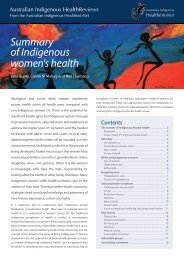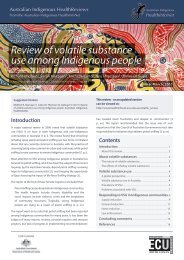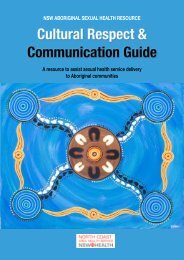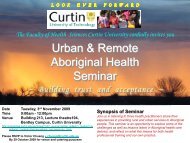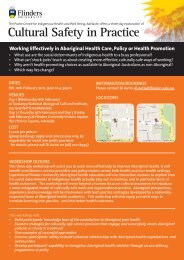hearing loss and the criminal justice system - Australian Indigenous ...
hearing loss and the criminal justice system - Australian Indigenous ...
hearing loss and the criminal justice system - Australian Indigenous ...
You also want an ePaper? Increase the reach of your titles
YUMPU automatically turns print PDFs into web optimized ePapers that Google loves.
Senate Inquiry March 2010_________________________________________________________________________________________________________________revealed that it covered <strong>the</strong> nature of Conductive Hearing Loss <strong>and</strong> how it came about, <strong>and</strong>some very general advice on communication strategies. However, <strong>the</strong> training had not beentailored to <strong>the</strong> particular issues arising in <strong>the</strong> work environment of corrections officers.I am not sure how often <strong>the</strong> once‐off general lectures occurred, but in recent inquiries Ilearnt that <strong>the</strong> current three month, full‐time training undertaken by new correctionsofficers contains no information on <strong>the</strong> implications of <strong>hearing</strong> <strong>loss</strong> among <strong>Indigenous</strong>prisoners. Nor has this subject matter been covered in any recent (last three years)professional development of corrections officers. This is in spite of <strong>the</strong> considerableincrease in overall training offered to corrections staff in an attempt to improve retentionrates.There was a similar scenario when teachers were provided with a ‘<strong>hearing</strong> program’ thatmainly informed <strong>the</strong>m about <strong>hearing</strong> health but did not address educational implications of<strong>hearing</strong> <strong>loss</strong> or <strong>the</strong> strategies that teachers might employ to minimise <strong>the</strong> educational <strong>and</strong>behavioural implications for children with <strong>hearing</strong> <strong>loss</strong>. Teachers felt <strong>the</strong>y had ‘done’<strong>hearing</strong> <strong>loss</strong> <strong>and</strong> were often disinterested in fur<strong>the</strong>r training that focused on <strong>the</strong> educationalissues of <strong>hearing</strong> <strong>loss</strong>.I outline this to highlight that I believe training about <strong>Indigenous</strong> <strong>hearing</strong> <strong>loss</strong> needs to beintroduced for police <strong>and</strong> correctional staff, <strong>and</strong> it needs to be based onresearch/consultancy that has considered <strong>the</strong> impact of <strong>hearing</strong> <strong>loss</strong> on communication in<strong>the</strong> communication environments in which police <strong>and</strong> correctional staff operate.NEEDS OF DEAF INDIGENOUS PEOPLEThe preceding information discussed <strong>the</strong> issues affecting40‐70 per cent of <strong>Indigenous</strong> people who are hard of<strong>hearing</strong> because of childhood ear disease. The situationis more dire for <strong>the</strong> smaller number of <strong>Indigenous</strong> peoplewho are Deaf (i.e. those who have severe to profoundlevels of <strong>hearing</strong> <strong>loss</strong>.The situation is more dire for <strong>the</strong>smaller number of <strong>Indigenous</strong>people who are Deaf (i.e. those whohave severe to profound levels of<strong>hearing</strong> <strong>loss</strong>.Deaf <strong>Indigenous</strong> people, who encounter <strong>the</strong> <strong>criminal</strong><strong>justice</strong> <strong>system</strong>, receive minimal support of <strong>the</strong> type accessed by <strong>the</strong> non‐<strong>Indigenous</strong> Deaf.These individuals have often had minimal or no schooling <strong>and</strong> can only communicate withone or a few family members. The lack of <strong>the</strong> necessary culturally appropriate support(Saxton‐Barney, 2010) results in <strong>the</strong>se people being extremely limited in <strong>the</strong>ir ability tocommunicate. This often means that <strong>the</strong>y are deprived of social contact, have limitedaccess to information <strong>and</strong> do not have <strong>the</strong> variety of experiences needed for normalcognitive development. As a result, many <strong>Indigenous</strong> Deaf people present with cognitiveimpairments when <strong>the</strong>y encounter <strong>the</strong> <strong>criminal</strong> <strong>justice</strong> <strong>system</strong>.Deaf <strong>Indigenous</strong> people are highly dependent on family support. When <strong>the</strong>y are away fromfamily or seeking to satisfy a need that family cannot provide (such as sexual involvements),<strong>the</strong>y engage with <strong>the</strong> wider community in ways that may bring <strong>the</strong>m into contact withpolice. Contact with <strong>the</strong> <strong>criminal</strong> <strong>justice</strong> <strong>system</strong> often begins in adolescence. Their inability_________________________________________________________________________________________________________________17 Phoenix Consulting



